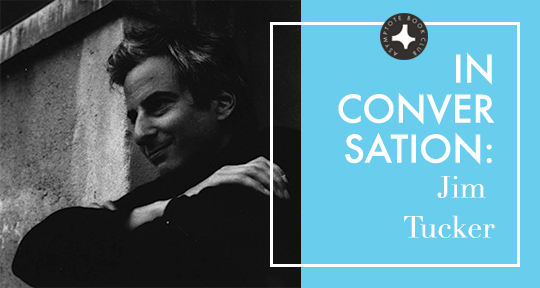Zsófia Bán’s Night School, “a textbook like no other,” is among the most playful of our fourteen Asymptote Book Club selections so far. In keeping with the book’s “defiant irreverence,” its English translator, Jim Tucker, agreed to ditch our regular interview format and temporarily become one of Night School’s pupils.
Each chapter of Zsófia Ban’s textbook ends in a series of questions or assignments, each with a winning mixture of pure zaniness and profound resonance. Here, Jim Tucker answers a set of questions from his own English translation of Night School.
Complete the following sentence: Look before . . .
Jim Tucker (JT): Look before . . . you enter the lion’s den. Which is the home address for translation, a job that can only be done wrong. It’s a miracle that you can make a living at it. Similar to prostitution (“Oh yes, mister, whatever you say”) except it pays a lot less, and you don’t get out as much.
Analyze the following expressions: “Ars longa, vita brevis.” “A pain in the ars.”
JT: Both weighty issues, all appearances to the contrary. Ars longa is the ambition of most every creative person. For most of them, it will not turn true. But inspiration does not discriminate, thankfully.
Vita brevis—well, this is the overarching theme of most of world literature, in addition to, say, a Zen outlook based on acceptance, another impossible goal that makes us feel inadequate. Very generative. Good stuff!
A pain in the ars. The British version, but one that even Americans can get behind (*coughs*). Generated from the previous sentence like Athena emerging from the head of Zeus with a complete set of the Kinks under her arm (possibly broken off). Endless incompleteness, seasoned with self-doubt and demons (all forms of certainty, to be sure). The whole thing is a pain in the arse and everywhere else, really. Depending on what the meaning of is is.
What do you conclude from the fact that a frog heart keeps beating even without the frog?
JT: Probably that the heart has no eyes, which is why it doesn’t really mind the whole thing. But we already knew that. In other words, sometimes you don’t need the whole frog. Very few writers have, or ever will.
And this is what makes a story great: it offers a world almost rigorously coherent on its own terms, and a mastery of expression that comes from inside and colors the world around it. Which also turns out to be our world, now liberated from all the gunk, and giving you a few days of the sublime, mingled with the sensuous and illegitimate and heartrending and, seemingly, indefatigably inventive best-of culture in a savvy blend that comes off as unforced (circus act). Believe it, or not. As you wish. No: as you can.
IN YOUR OPINION, if there are only two towers in Nagyabony but thirty-two in Milan, which would you rather see? Argue pro or con.
JT: I see what you did there! Are towers for being seen? Are you planning to violate all the towers in Milan via gaze, you with your miserable Italian? They’re surely more numerous than their cousins en protubérance over in Nagyabony, who might not even have enough information right now to be forging opinions, sequestered as they are by a forcefield of torpor and bloodletting coming from the Buda Castle, where a private band of centurions rings the tyrant like a . . . something or other. He is well fed.
But, opines the thoughtful reader: Dr. Bán in the corner, where does she stand on all this? Everywhere, actually, or what seems like everywhere. There’s a slice of her that is a précis of post-Enlightenment European literature, and another, deeply personal Dr. Bán who masterfully offers a good long look at the inside of her spirit, a vast boxful of toys.
But on the whole, I’d just skip the towers and follow your nose.
Is it true there is “no hope”?
JT: Yes.


Jim Tucker translated works from German, French, and Italian before discovering Hungarian, with which he seems quite content. He has translated novels and essays of George Konrád and a number of other modern Hungarian authors, and is currently preparing an anthology of contemporary Hungarian poetry from Transylvania.